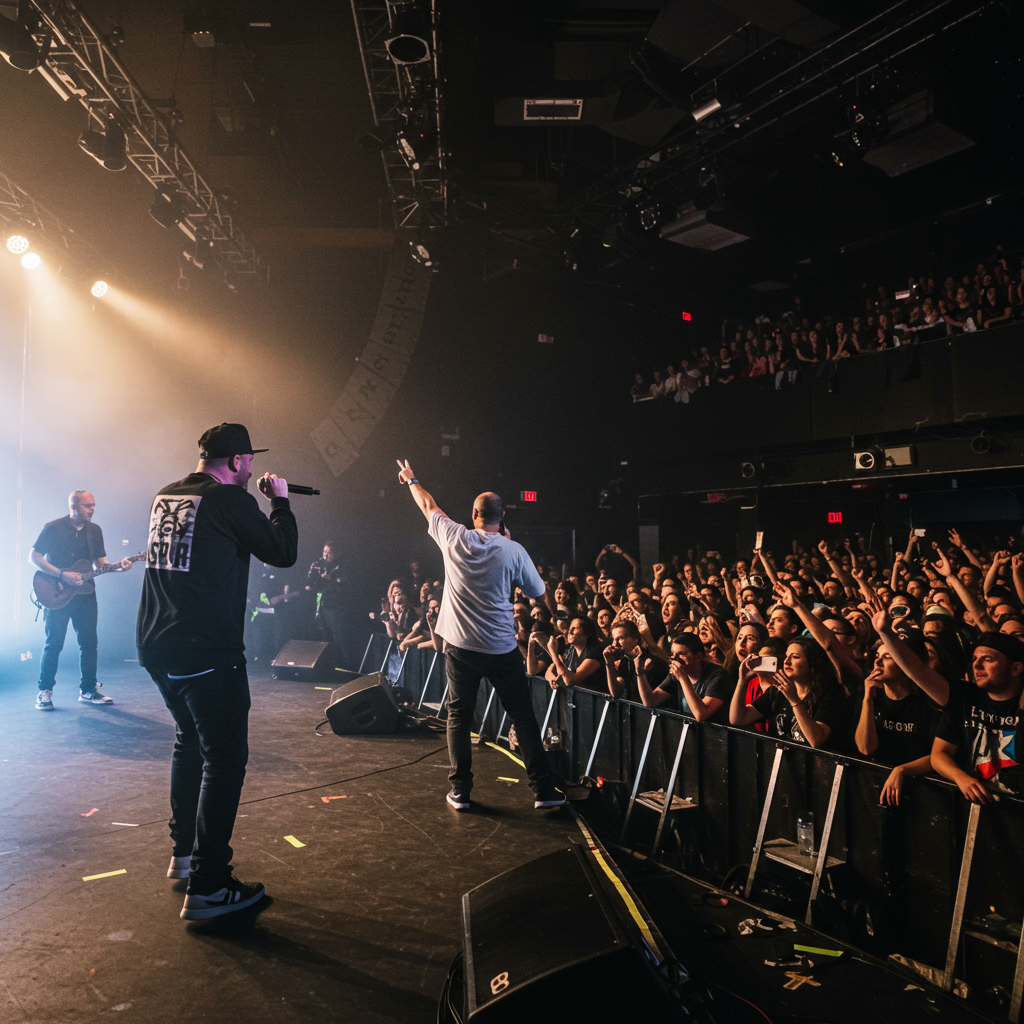Irish rap sensation kneecap has landed a last-minute headline show in Glasgow after their scheduled performance at the major TRNSMT festival was abruptly cancelled. The rapid booking at the city’s O2 Academy saw tickets vanish in a record-breaking 80 seconds, highlighting immense fan demand despite – or perhaps because of – a swirling storm of controversies surrounding the group. This turn of events follows months of escalating tensions over the band’s public statements and actions, which festival organizers ultimately cited as posing significant police safety concerns.
The Belfast-based trio, known for their politically charged lyrics delivered in both English and Irish, was originally slated to appear on the King Tut’s stage at TRNSMT on Friday, July 11th. Their removal from the bill stems from a confluence of factors, primarily linked to recent legal issues and public outcry over controversial footage and statements. The cancellation announcement, made by the band on social media, cited police concerns about safety at the festival event as the reason, emphasizing that the decision was entirely “out of [their] hands.”
TRNSMT Slot Axed Amid Police Concerns
The decision to remove Kneecap from the highly anticipated TRNSMT lineup was communicated by festival promoters DF Concerts. They confirmed that police authorities had raised specific concerns regarding the band’s performance. Police Scotland clarified their role, stating they had “passed on information from the public around safety concerns” to the organizers. This information suggested that a Kneecap set would require a “significant policing operation” due to potential audience reactions. While police provided this assessment and highlighted operational requirements, they stressed there was “no prior consultation” on the band’s initial booking, and the final determination to drop the group rested solely with the promoter.
For Kneecap and their loyal fanbase, the cancellation of the TRNSMT show was a significant blow. The band expressed regret, particularly to the “thousands of people who bought tickets, flights and hotels to see us play.” They also pointedly noted their extensive history playing in Glasgow “many many times, with no issues – ever,” adding, “Make of that what you will.” This statement hinted at their view that the safety concerns cited might be influenced by factors beyond typical crowd management. The swift action by DF Concerts, coming after police communication, underscored the seriousness with which the authorities viewed the potential risks associated with a Kneecap performance at the large-scale festival.
Sold-Out O2 Academy Gig Sets New Record
In the wake of the TRNSMT news, Kneecap wasted no time announcing an alternative plan for their Glasgow fans. A headlining show at the O2 Academy was scheduled for Tuesday, July 8th, just days before their cancelled festival slot. The response was nothing short of phenomenal. Pre-sale tickets for the O2 Academy gig reportedly sold out in an astonishing 80 seconds, prompting the band to declare it a “new record” for the venue. General sale tickets were also anticipated to sell out immediately.
The rapid sell-out is a clear indicator of the band’s immense popularity and the dedication of their fanbase, many of whom were left disappointed by the TRNSMT cancellation. Social media saw numerous fans voicing frustration and demanding refunds for their festival tickets, stating that seeing Kneecap was a primary, if not the sole, reason for their planned attendance. This included one Scottish fan who sought a refund because Kneecap was the only act she intended to see with her teenage daughter. The swift securing and selling out of the O2 Academy gig demonstrates the band’s ability to mobilize their audience and find alternative platforms, even when faced with significant industry hurdles.
Controversies Fueling the Fire
The safety concerns cited by police and promoters are directly linked to a series of high-profile controversies that have dogged Kneecap in recent months, dramatically increasing their notoriety. One primary issue involves band member Mo Chara (real name Liam Óg Ó hAnnaidh). In November of the previous year, at a gig in London’s O2 Forum in Kentish Town, footage emerged appearing to show him holding a Hezbollah flag. Hezbollah is a proscribed organization in the UK, meaning expressing support for it is a criminal offence.
Following an investigation by the Metropolitan Police’s counter-terrorism command, Liam Óg Ó hAnnaidh was charged with a terrorism offence. The specific charge is for displaying a flag “in such a way or in such circumstances as to arouse reasonable suspicion that he is a supporter of a proscribed organisation.” He appeared at Westminster Magistrates’ Court on June 18th in relation to this charge and was released on unconditional bail. This ongoing legal process casts a long shadow over the band and was a key factor in the recent festival cancellations.
Outcry Over “Kill Your Local MP” Comments
Beyond the Hezbollah flag incident, Kneecap has also faced severe criticism for comments made during a 2023 gig. Footage circulated appearing to show one member stating, “The only good Tory is a dead Tory. Kill your local MP.” These remarks drew widespread condemnation, particularly from figures like Katie Amess, daughter of Conservative MP Sir David Amess, who was murdered in 2021 while holding a constituency surgery. Labour MP Jo Cox was also murdered in 2016.
Scotland’s First Minister, John Swinney, was among those who publicly stated that these comments had “crossed a line” and indicated that Kneecap should not be allowed to perform at events like TRNSMT, which takes place on Glasgow Green every July. He described the comments as “so beyond the pale.” While the Met Police initially investigated this footage, they ultimately declined to take further action, citing that the potential offences were beyond the statutory time limit for prosecution. The band later issued an apology to the families of Sir David Amess and Jo Cox regarding the comments, claiming the footage had been taken out of context and was being “exploited and weaponised.”
Band Claims “Smear Campaign” Linked to Palestine Support
Kneecap has consistently denied supporting Hamas or Hezbollah and maintains that footage of the flag incident, as well as their controversial comments, have been taken out of context. They argue that the intense scrutiny and recent challenges, including festival cancellations and the terror charge, are part of a deliberate “smear campaign” targeting them. They attribute this alleged campaign to their outspoken support for Palestine and their strong criticism of Israel’s actions in Gaza, which they describe as genocide.
The band cites specific instances to support this claim. They reported receiving death threats and being dropped by their booking agent after displaying messages about Gaza during their set at the US music festival Coachella in April. At a recent performance at London’s Wide Awake Festival, Mo Chara explicitly suggested the terror charge against him was expedited specifically to prevent them from playing at Glastonbury Festival this summer. He described the process as unusually quick compared to typical interviews with counter-terror police, asserting, “We are being made an example of. The Israeli lobbyists are trying to prove to other artists ‘that if you speak out, we’re going to hit you where it hurts most’. They’re trying to cancel gigs, they trying to cancel my freedom of travel.” Kneecap describes the situation as a “carnival of distraction” and “political policing,” arguing that the real issue is “Genocide is.”
Wider Impacts and Legal Successes
The TRNSMT cancellation is not the only recent setback for the group. They have reportedly experienced other cancellations, including previously scheduled performances at Germany’s Hurricane and Southside Festivals, Cornwall’s Eden Project, and a planned replacement show in Plymouth. Political pressure has also mounted, with various MPs calling for their removal from festival lineups. Despite this, Kneecap is currently still scheduled to perform at Glastonbury and the 2000trees festival in July.
Amidst the controversies, the band has also seen legal success on a different front. They previously engaged in legal action against the UK government after ministers initially blocked them from receiving a £15,000 funding award designed to support UK-registered artists in global markets. The then Conservative administration intervened, stating a group behind songs like ‘Get Your Brits Out’ should not benefit from British taxpayers. However, a court hearing sided with Kneecap, awarding them the original amount of £14,250. Separately from their music, Kneecap also released an acclaimed film last year that received six Bafta nominations, demonstrating their creative output extends beyond the music scene.
Commentary on Creative Expression and Censorship
The events surrounding Kneecap have prompted broader discussions within the music industry and beyond about freedom of expression and potential censorship. Musician Billy Bragg has publicly offered his support to Kneecap, interpreting the terror charge against Mo Chara as part of a “disturbing and broader trend” where the state criminalizes creative expression, particularly targeting rap music.
Bragg points to statistics indicating that prosecutors have increasingly used lyrics, music videos, or audio recordings in court cases, arguing that “vague, sweeping definitions of ‘gang’ activity” are often applied to rap music to implicate individuals. He highlights that this trend disproportionately affects young Black men and boys from marginalized communities. While acknowledging artists should be responsible for their actions, Bragg contends that creative expression itself should not be grounds for criminal charges. This perspective adds another layer to the debate surrounding Kneecap, positioning their situation within a wider conversation about state power, artistic freedom, and the targeting of certain musical genres and communities.
The band members themselves have suggested that they “like people to get riled up,” indicating that provoking reaction is part of their artistic approach. This willingness to court controversy likely contributes to both their rapid rise in profile and the intense backlash they face. As Mo Chara’s legal case progresses and the band navigates future bookings, the interplay between their provocative art, political activism, and the response from authorities and the public will continue to unfold.
Frequently Asked Questions
Why was Kneecap removed from the TRNSMT festival lineup?
Kneecap was removed from the TRNSMT festival by organizers, DF Concerts, due to “safety concerns.” These concerns were reportedly communicated by Police Scotland, who advised that a performance by the band could necessitate a “significant policing operation” due to potential audience reaction, following recent controversies surrounding the group’s statements and a band member’s terror charge.
Where is Kneecap playing in Glasgow instead of TRNSMT?
Kneecap quickly announced a replacement headline gig at Glasgow’s O2 Academy. This show is scheduled for Tuesday, July 8th, just three days before their originally planned TRNSMT slot on July 11th. Tickets for the O2 Academy show sold out in a rapid 80 seconds.
What controversies have led to these issues for Kneecap?
Several controversies have contributed to the recent issues. These include band member Mo Chara being charged with a terror offence related to allegedly displaying a Hezbollah flag at a November 2024 gig, and backlash over footage from a 2023 concert where a member appeared to make comments about killing MPs. The band claims these controversies are part of a “smear campaign” linked to their outspoken support for Palestine and criticism of Israel’s actions in Gaza.
The cancellation of Kneecap’s TRNSMT performance and the subsequent rapid sell-out of their replacement show in Glasgow encapsulate the complex and highly charged environment surrounding the group. Their blend of provocative music, political activism, and willingness to engage with controversial topics has catapulted them into the spotlight, attracting both fervent support and intense opposition from political figures, police, and the public. As they navigate ongoing legal challenges and scheduled performances, including at Glastonbury, Kneecap’s journey highlights the tensions between artistic expression, political messaging, and the response of authorities in a rapidly changing cultural landscape. The band denies inciting violence and views the current situation through the lens of political targeting related to their stance on global events.
Word Count Check: 1126




